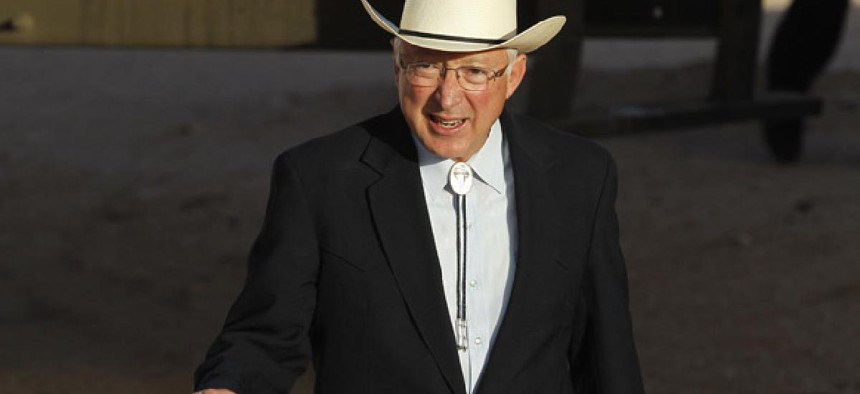
Interior Department Secretary Ken Salazar
Can lawmakers hold Cabinet salaries hostage?
Ethics panel weighs in on Louisiana senator’s attempts to tie Interior secretary’s pay to oil drilling permits.
The debate over a Cabinet secretary’s pay raise has escalated into a congressional ethics showdown.
In May 2011, Sen. David Vitter, R-La., announced he intended to block legislation that would give Interior Department Secretary Ken Salazar a $19,600 salary increase, until Salazar agreed to authorize more permits for exploratory oil drilling in the Gulf of Mexico. The pay increase would put Salazar on par with other Cabinet secretaries. Now the Senate Select Committee on Ethics has weighed in on the matter, electing not to charge Vitter with a rules violation for his actions, but noting it will not sanction such behavior in the future.
In a letter sent to Vitter Thursday and made public on Friday, Committee Chairwoman Barbara Boxer, D-Calif., and ranking member Johnny Isakson, R-Ga., said there was no Senate guidance that clearly prohibited senators from placing holds on Cabinet secretaries’ salary bumps until they meet certain demands. Later that day Boxer and Isakson issued new guidance stating such actions would now be viewed as improper conduct.
“While the committee found that there was no substantial credible evidence that you violated the law or Senate rules, it did conclude that it is inappropriate to condition support for a secretary’s personal salary increase directly on his or her performance of a specific official act,” Boxer and Isakson wrote in the letter to Vitter.
Cabinet secretaries currently earn $199,700, but because he left the Senate for the job in 2009 under the appointment of President Obama, Salazar’s pay has been limited to 2005 levels, the year he became a senator, the Associated Press reported. The Constitution forbids members of Congress from appointment to a U.S. office where compensation was increased during the lawmaker’s term.
The Ethics Committee’s letters come in response to a June 2011 complaint about Vitter’s actions filed by government watchdog group Citizens for Responsibility and Ethics in Washington. Vitter said in May 2011 that he wanted Salazar to authorize six new deep-water drilling permits per month, raising the number of permits back to the level before the drilling moratorium imposed in the wake of BP’s 2010 Deepwater Horizon disaster.
In a statement Friday, Vitter said Salazar “has completely failed us on energy policy.” The senator said he will continue to block the raise as long as Salazar does not acquiesce to his desired rate of granting oil-drilling permits. "And I'll absolutely place a hold on any raise for him in the future," Vitter added.
When he originally blocked Salazar’s pay increase in May 2011, Vitter said in a statement that his actions were “just my way of keeping the ‘boot on the neck’ of Interior until they get the job done.”
On Friday CREW Executive Director Melanie Sloan said in a statement, “So now senators need guidance to know extortion and bribery violate Senate rules? If the Ethics Committee hasn’t issued specific advance guidance, senators can’t be held accountable for outrageous conduct? How about if the Ethics Committee just issues this blanket guidance: Criminal conduct violates the rules."
NEXT STORY: TSP fund growth slows in March






